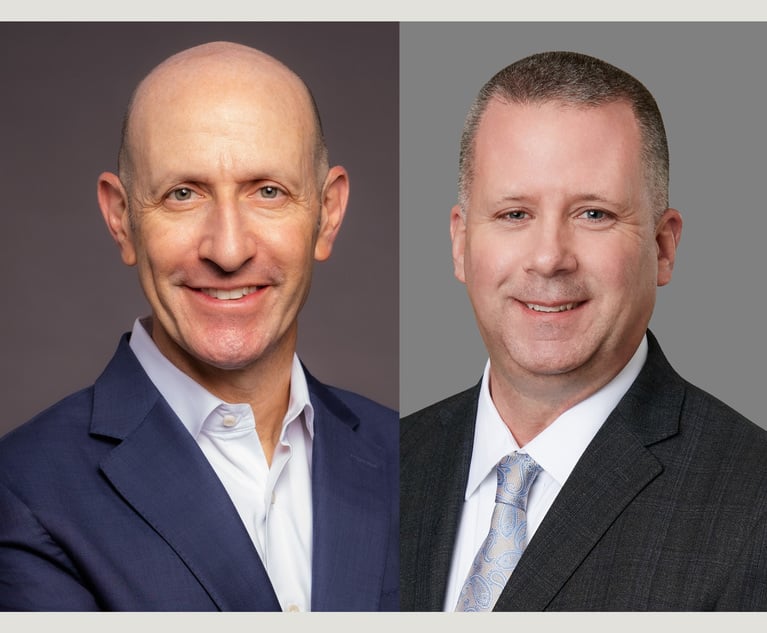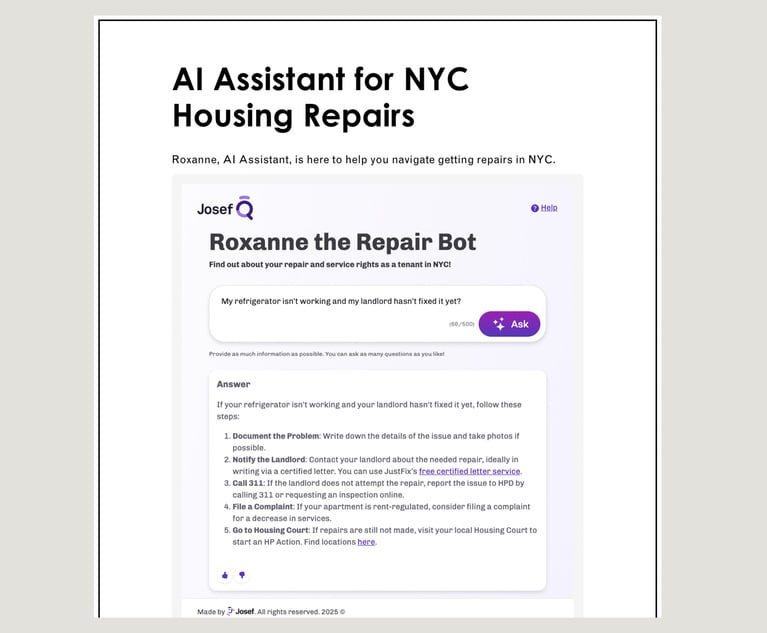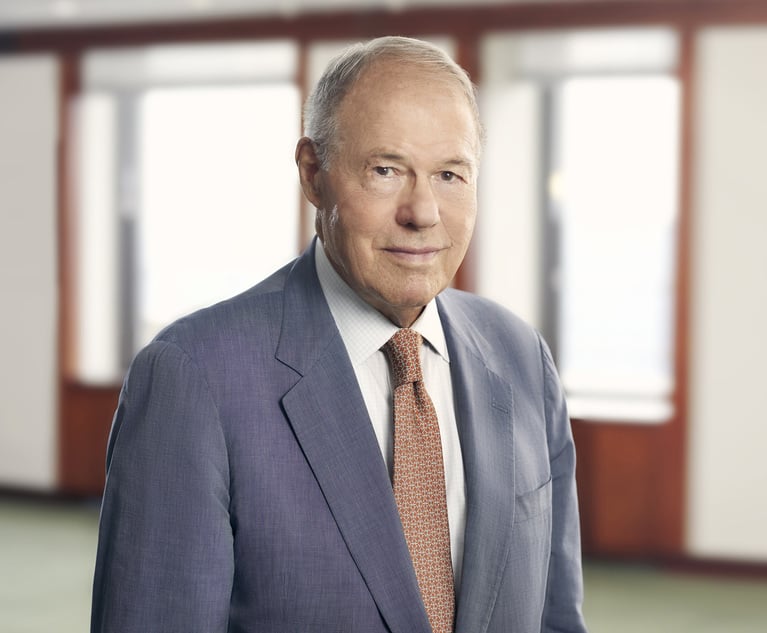In State of the Judiciary Speech, Chief Judge Janet DiFiore Tackles Opioid Addiction, Homelessness and Case Backlogs
While announcing a dramatic reduction in backlogs in both civil and criminal courts from one corner of the state to the other, Chief Judge Janet DiFiore concentrated her remarks Tuesday on ways to make the system fairer and more efficient.
February 06, 2018 at 12:00 PM
6 minute read

In her State of the Judiciary speech Tuesday, Chief Judge Janet DiFiore set in motion new procedures to treat opioid addiction, reduce homelessness and move cases more quickly through the court system.
While announcing dramatic reductions in backlogs in both civil and criminal courts from one corner of the state to the other, DiFiore concentrated her remarks on ways to make the system fairer and more efficient.
She said her signature Excellence Initiative, which she launched upon becoming chief judge two years ago, was responsible for the decline in caseloads. But she also credited many of the assignment judges assembled in the Court of Appeals Hall to hear her annual speech for fashioning unique ways to improve the courts under their jurisdictions.
“The state of our society is reflected in our court dockets,” she said. “And whether it is criminal justice reform, Rikers Island, homelessness, foreclosures, opioid abuse or an alarming increase in child abuse and neglect cases—it is our responsibility to respond.”
Touting the success of the Buffalo Opioid Intervention Court, which had only one death among its 204 participants, she announced a statewide opioid initiative. While there won't necessarily be opioid courts in every county, Chief Administrative Judge Lawrence Marks said such courts would likely be created in “counties where the problem justifies a distinct court and approach. The analysis underway will determine that.”
A program in the Bronx, which provides intensive drug treatment instead of jail time. will be extended to the rest of New York City, DiFiore said in the speech.
“According to the latest numbers from the Centers for Disease Control and Prevention, over 64,000 people died from drug overdoses in the United States in 2016, more than the number of American lives lost during the entirety of the Vietnam War,” she said.
On the issue of backlogs, DiFiore looked both backward and forward. Backward to her first State of the Judiciary speech where she pledged to eliminate unproductive appearances and wasteful adjournments and increase trial capacity for misdemeanor cases in New York City courts.
“Since the Excellence Initiative was launched, we have reduced the number of our oldest misdemeanor cases by 80 percent in Manhattan, 71 percent in Bronx County and 61 percent citywide,” she said. “In New York City, eliminating our felony backlogs has been more challenging, due largely to the sheer volume of cases in those courts. Nonetheless, we are making encouraging inroads.”
In Bronx County, the number of felony cases pending for more than 180 days is down by 28 percent since the start of the Excellence Initiative; Queens County is down by 15 percent; and in Kings County that number is down by 16 percent in just the last year, she said.
Outside New York City, the number of felony cases pending more than 180 days has been reduced by 53 percent over two years, with the Ninth Judicial District achieving a 91 percent reduction, the Seventh Judicial District down 77 percent and Suffolk County down 65 percent. DiFiore said that backlogs have all but been eliminated in the 14 counties in those districts.
DiFiore made several proposals for moving cases more quickly including Superior Court Informations, or SCI, where defendants waive their right to prosecution by indictment. She said this option was underutilized in New York City, which hears 43 percent of the state's criminal cases. The average time to dispose of a case by indictment in the city is 277 days, while the average time for an SCI is 120 days.
“We have seen good improvement in reducing felony backlogs in New York City, but more progress needs to be made. Increasing the number of Superior Court Information dispositions, which are used with great effectiveness outside of New York City to resolve felony cases at the front end, can have a big impact on our efforts to eliminate backlogs,” Marks said.
DiFiore said new software installed in New York City that automatically displays when and where attorneys are scheduled to appear in court was ”reducing the frequency with which hearings and trials must be adjourned and rescheduled due to scheduling conflicts on the part of defense counsel, whose heavy caseloads often require them to be in three places at once.”
On the issue of Housing Court, DiFiore said, “New York City is experiencing its highest levels of homelessness since the Great Depression.
“Not surprisingly, the commission found that the New York City Housing Court is one of the busiest, most overburdened courts in the nation. And as you might imagine, the litigants in this court are overwhelmingly people of modest means, frightened of losing their homes or frustrated by living conditions that threaten the health and well-being of their families,” she said.
During her speech, DiFiore announced that the Special Commission on the Future of New York City Housing Court has finished its report, which she released Tuesday. The commission looked at the implications of the Universal Access law, which ensures that low-income tenants facing eviction have attorneys.
“The Universal Access law will be implemented over the next five years and will transform Housing Court litigation. But even as the volume of unrepresented litigants substantially declines, there is a risk that, without careful planning, an already overcrowded docket could become even more unwieldy and slow-moving,” the task force said in its report.
DiFiore announced that Marks will lead a group of high-level judges and court managers responsible for implementing the commission's recommended changes, which include new procedures and practices, new technology, new courthouses and more judges, clerks and interpreters.
“We can look back on the last two years with great pride and a sense of accomplishment. And while there is more to do, we look to the future with confidence and optimism, because we are poised and positioned to build upon everything we have achieved to date,” she said.
This content has been archived. It is available through our partners, LexisNexis® and Bloomberg Law.
To view this content, please continue to their sites.
Not a Lexis Subscriber?
Subscribe Now
Not a Bloomberg Law Subscriber?
Subscribe Now
NOT FOR REPRINT
© 2025 ALM Global, LLC, All Rights Reserved. Request academic re-use from www.copyright.com. All other uses, submit a request to [email protected]. For more information visit Asset & Logo Licensing.
You Might Like
View All
Meet the Long Island Judge Tapped to Be US Attorney for Eastern District of New York
2 minute read
New York’s Property Tax Incentives and Abatements Make Development Feasible
7 minute read
Josef Partners With NYU, Housing Court Answers to Launch AI Assistant Built for Tenants

Trending Stories
- 1Husch Blackwell Hires Former Adobe Counsel to Oversee AI Advisory Offering
- 2CFPB Finalizes Rule Removing Medical Debt From Credit Reports
- 3'Don't F-- With Me in My Court:' Texas Judge in Hot Water
- 4Special Counsel Jack Smith Prepares Final Report as Trump Opposes Its Release
- 5Appeals Court Rejects Trump Attempt to Delay Friday Sentencing
Who Got The Work
Michael G. Bongiorno, Andrew Scott Dulberg and Elizabeth E. Driscoll from Wilmer Cutler Pickering Hale and Dorr have stepped in to represent Symbotic Inc., an A.I.-enabled technology platform that focuses on increasing supply chain efficiency, and other defendants in a pending shareholder derivative lawsuit. The case, filed Oct. 2 in Massachusetts District Court by the Brown Law Firm on behalf of Stephen Austen, accuses certain officers and directors of misleading investors in regard to Symbotic's potential for margin growth by failing to disclose that the company was not equipped to timely deploy its systems or manage expenses through project delays. The case, assigned to U.S. District Judge Nathaniel M. Gorton, is 1:24-cv-12522, Austen v. Cohen et al.
Who Got The Work
Edmund Polubinski and Marie Killmond of Davis Polk & Wardwell have entered appearances for data platform software development company MongoDB and other defendants in a pending shareholder derivative lawsuit. The action, filed Oct. 7 in New York Southern District Court by the Brown Law Firm, accuses the company's directors and/or officers of falsely expressing confidence in the company’s restructuring of its sales incentive plan and downplaying the severity of decreases in its upfront commitments. The case is 1:24-cv-07594, Roy v. Ittycheria et al.
Who Got The Work
Amy O. Bruchs and Kurt F. Ellison of Michael Best & Friedrich have entered appearances for Epic Systems Corp. in a pending employment discrimination lawsuit. The suit was filed Sept. 7 in Wisconsin Western District Court by Levine Eisberner LLC and Siri & Glimstad on behalf of a project manager who claims that he was wrongfully terminated after applying for a religious exemption to the defendant's COVID-19 vaccine mandate. The case, assigned to U.S. Magistrate Judge Anita Marie Boor, is 3:24-cv-00630, Secker, Nathan v. Epic Systems Corporation.
Who Got The Work
David X. Sullivan, Thomas J. Finn and Gregory A. Hall from McCarter & English have entered appearances for Sunrun Installation Services in a pending civil rights lawsuit. The complaint was filed Sept. 4 in Connecticut District Court by attorney Robert M. Berke on behalf of former employee George Edward Steins, who was arrested and charged with employing an unregistered home improvement salesperson. The complaint alleges that had Sunrun informed the Connecticut Department of Consumer Protection that the plaintiff's employment had ended in 2017 and that he no longer held Sunrun's home improvement contractor license, he would not have been hit with charges, which were dismissed in May 2024. The case, assigned to U.S. District Judge Jeffrey A. Meyer, is 3:24-cv-01423, Steins v. Sunrun, Inc. et al.
Who Got The Work
Greenberg Traurig shareholder Joshua L. Raskin has entered an appearance for boohoo.com UK Ltd. in a pending patent infringement lawsuit. The suit, filed Sept. 3 in Texas Eastern District Court by Rozier Hardt McDonough on behalf of Alto Dynamics, asserts five patents related to an online shopping platform. The case, assigned to U.S. District Judge Rodney Gilstrap, is 2:24-cv-00719, Alto Dynamics, LLC v. boohoo.com UK Limited.
Featured Firms
Law Offices of Gary Martin Hays & Associates, P.C.
(470) 294-1674
Law Offices of Mark E. Salomone
(857) 444-6468
Smith & Hassler
(713) 739-1250






